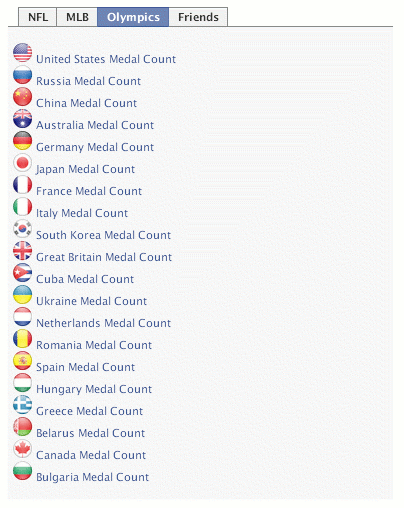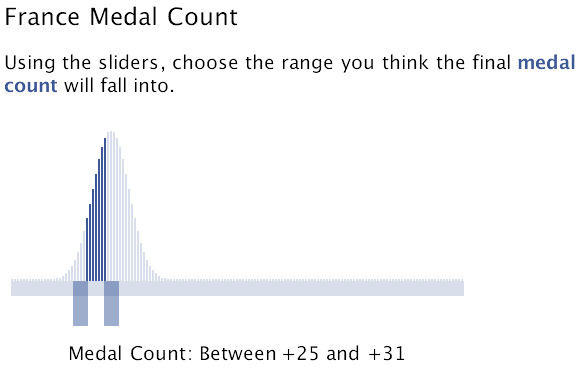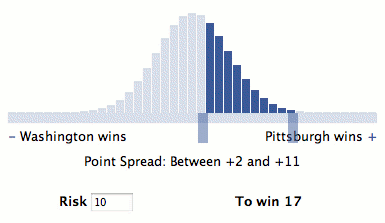WeatherBill let’s you construct an enormous variety of insurance contracts related to weather. For example, the screenshot embedded below shows how I might have insured my vacation at the New Jersey shore:
For $42.62 I could have arranged to be paid $100 per day of rain during my vacation.
(I didn’t actually purchase this mainly because the US government insists that I am a menace to myself and should not be allowed to enter into such a dangerous gamble — more on this later. And as Dan Reeves pointed out to me, it’s probably not rational to do for small sums.)
WeatherBill can also be thought of as a combinatorial prediction market with an automated market maker, a viewpoint I’ll expand on now.
On WeatherBill, you piece together contracts by specifying a series of attributes: date range, place, type of weather, threshold temperature or participation level, minimum and maximum number of bad-weather days, etc. The user interface is extremely well done: a straightforward series of adaptive menu choices and text entry fields guide the customer through the selection process.
This flexibility quickly leads to a combinatorial explosion: given the choices on the site I’m sure the number of possible contracts you can construct runs into the millions.
Once you’ve defined when you want to be paid — according to whatever definition of bad weather makes sense for you or your business — you choose how much you want to be paid.
Finally, given all this information, WeatherBill quotes a price for your custom insurance contract, in effect the maximum amount you will lose if bad weather doesn’t materialize. Quotes are instantaneous — essentially WeatherBill is an automated market maker always willing to trade at some price on any of millions of contracts.
Side note: On WeatherBill, you control the magnitude of your bet by choosing how much you want to be paid. In a typical prediction market, you control magnitude by choosing how many shares to trade. In our own prediction market Yoopick, you control magnitude by choosing the maximum amount you are willing to lose. All three approaches are equivalent, and what’s best depends on context. I would argue that the WeatherBill and Yoopick approaches are simpler to understand, requiring less indirection. The WeatherBill approach seems most natural in an insurance context and the Yoopick approach in a gambling context.
How does the WeatherBill market maker determine prices? I don’t know the details, but their FAQ says that prices change “due to a number of factors, including WeatherBill forecast data, weather simulation, and recent Contract sales”. Certainly historical data plays an important role — in fact, with every price quote WeatherBill tells you what you would have been paid in years past. They allow contracts as few as four days into the future, so I imagine they incorporate current weather forecasts. And the FAQ implies that some form of market feedback occurs, raising prices on contract terms that are in high demand.
Interface is important. WeatherBill shows that a very complicated combinatorial market can be presented in a natural and intuitive way. Though greater expressiveness can mean greater complexity and confusion, Tuomas Sandholm is fond of pointing out that, when done right, expressiveness actually simplifies things by allowing users to speak in terms they are familiar with. WeatherBill — and to an extent Yoopick IMHO — are examples of this somewhat counterintuitive principle at work.
There is another quote from WeatherBill’s FAQ that alludes to an even higher degree of combinatorics coming soon:
Currently you can only price contracts based on one weather measurement. We’re working on making it possible to use more than one measurement, and hope to make it available soon.
If so, I can imagine the number of possible insurance contracts quickly growing into the billions or more with prices hinging on interdependencies among weather events.
Finally, back to the US government treating me like a child. It turns out that only a very limited set of people can buy contracts on WeatherBill, mainly businesses and multi-millionaires who aren’t speculators. In fact, the rules of who can play are a convoluted jumble that I believe are based on regulations from the US Commodity Futures Trading Commission.
Luckily, WeatherBill provides a nice “choose your own adventure” style navigation flow to determine whether you are allowed to participate. Most people will quickly find they are not eligible. (I don’t officially endorse the CYOA standard of re-starting over and over again until you pass.)
Even if red tape locks the average consumer out of direct access, clever companies are stepping in to mediate. In a nice intro piece on WeatherBill, Newsweek mentions that Priceline used WeatherBill to back a “Sunshine Guaranteed” promotion offering refunds to customers whose trips were rained out.
Can you think of other end-arounds to bring WeatherBill functionality to the masses? What other forms of expressive insurance would you like to see?


